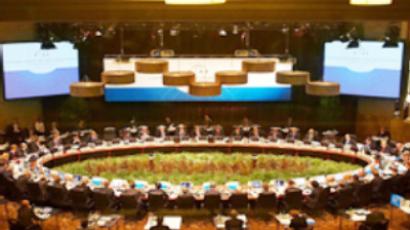Friday's press review

Friday’s Russian newspapers predict success at the Russia-EU summit in France, express doubt about unity at the Washington summit of the G20, analyze Iran’s missile capability, and specify the impact of the global financial crisis on Russia. Here is the r
KOMMERSANT writes about the Russia-EU summit in Nice: the general feeling is that the summit is going to be a success. The EU, says the paper, is ready to restart negotiations on a new Partnership and Cooperation agreement, while President Medvedev has announced that the plans to deploy Iskander missiles off Kaliningrad may change if Europe and U.S. agree to replace the proposed U.S. missile defense in Europe with a tri-party joint missile defense operation (The U.S., EU and Russia) or if the U.S. would discontinue its plans for missile defense elements in Eastern Europe.
However, says the paper, this is only the beginning of a very long road: the paper quotes Russian diplomats as saying that the Partnership and Cooperation agreement is going to take at least a year or two to be finalized and signed. Main discussions on the missile defense issue are also still ahead of us, continues the paper. It concludes that working out a common position on crisis management for the summit of the G20 in Washington is going to take up most of the working hours of the Nice summit.
VREMIA NOVOSTEI’s Andrey Denisov writes that with the date of the G20 summit in Washington getting closer, the expectations of its participants are getting lower. He writes that this week Brazil voiced its doubts about the success of the meeting, then the IMF hinted at the fact that forming a new financial system is a lengthy process for which no one has time in the midst of a crisis, and finally China warned that all problems cannot be solved at such a short meeting.
The writer says that Russia’s position on the issue of the reform of the world financial system is quite close to what the EU nations are going to present in Washington. He says the reason for that is the fact that the crisis, having originated in the U.S., has created a new set of contradictions not only of the traditional kind that exists between the developed and developing countries but contradictions between Europe where the coming of the crisis was predicted several years before it really hit, and the U.S. which didn’t want to listen to the European warnings.
The writer notes that the U.S. position against financial controls has remained unchanged, judging by the draft documents disseminated by the U.S. as the host of the summit. The Russian suggestion based on the idea of the reform of the world financial system has also been distributed to all the participants of the summit, notes the writer. The headline of the article calls the meeting ‘A summit of contradictions.’ In the final paragraph the writer wonders if one working weekend would be enough to solve the troubles of humankind, especially with the IMF, the main subject of discussion, admitting that it is unready for change at the moment.
KOMSOMOLSKAYA PRAVDA quotes Egor Gaidar, the Director of the Transitional Economy Institute in Moscow, who says that only by a joint effort of nations with fast developing economies, like Russia, China, India and Brazil. The academic and former politician says: the system when the U.S. and Europe were talking while others kept silent belongs in the 1940s. Living that way and at the same time asking China for money is unrealistic, continues Gaidar.
TRUD estimates Iran’s missile capability after an announcement by the Iranian ministry of defense that claimed a successful launch of a 2000km-range ballistic missile. The paper says if the claim is true, there’s no danger for Europe or Russia at the moment, but Israel, Turkey and the U.S. bases in the Persian gulf are all within the range of the new weapon. The paper says the CIA predicts that seven years from now Iran will have ballistic missiles capable of reaching the American Continent.
Russian experts are quoted by the paper on the issue: Alexandr Khramchikhin of the Institute of Political and Military Analysis says that it is not always wise to trust announcements by the Iranian government. Many U.S. experts consider this one to be a bluff and I agree with them. Anatoly Tsyganok of the Center of Military Prognoses says: ‘The usual policy of the U.S. is first to deploy their missile defense system in Eastern Europe, and check the intelligence later. I am convinced that no ‘third World’ country can produce missiles capable of a strike on the U.S. territory in the foreseeable future.’
IZVESTIA has an exclusive interview with a prominent Russian right-wing politician and statesman, Anatoly Chubais, who at the moment holds the position of the Head of the Russian state Corporation for Nanotechnology, ROSNANO. On the matter of the ongoing financial crisis Chubais says that he agrees with the measures taken by the Russian Government, including the government purchase of parts of the stock of the private enterprises at risk and direct financial injections to commercial banks. However, he says, it is important that these measures are seen by everyone as temporary solutions. He continues: two, three years from now the Government should withdraw from the saved businesses, or else it will become permanent nationalization. Chubais says his experience tells him that attempts to make the arrangement permanent will happen in due course, and it is important that the government as a whole maintains its status as a regulator and temporary holder, but not owner of these assets.
Evgeny Belenkiy, RT.














